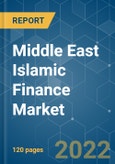Key Highlights
- The importance of the wider Middle East region continues to be clear, accounting for 77.4% of total Sharia-compliant assets in the latest ranking. Iran and Saudi Arabia remain by far the largest markets when it comes to Sharia-compliant assets, with both markets having more than $400bn in assets.
- Six of the 10 largest Islamic lenders come from those two countries, with only one, Malaysia’s Malayan Banking Berhad (Maybank), coming from outside the Middle East. Islamic finance is deeply rooted in the Middle East, a region that continues to shape the modern Islamic finance industry globally. Commanding the lion's share of global Islamic banking and finance assets and wielding enormous influence in the industry, the Middle East has always been an integral part of Islamic finance.
- The post-COVID scenario of the Middle East Islamic finance market has seen a steady recovery with increased demand for Sharia-compliant financial products and services. Islamic banks have adapted to the new normal by leveraging digital platforms and expanding their offerings. Overall, the market is showing resilience and growth opportunities.
Middle East Islamic Finance Market Trends
Growing Fintech Digital Sukuk
- The Gulf has seen a boom in funding for fintech startups. Fintech companies and digital sukuk could be two key growth drivers of the global Islamic finance industry in the Middle East and North Africa.
- Traditional Sharia-compliant bonds, called sukuk, have been popular since the early 2000s. Sukuk was developed as an alternative to conventional bonds that are not considered permissible by many Muslims, as the deals involve paying interest (riba).
- The Sukuk market was worth USD 193.2 billion in 2022, with the main issuers being Malaysia, Indonesia, and Saudi Arabia.
Iran is Leading the Islamic Banking
- Iran's role in leading Islamic banking has had a significant impact on the Middle East Islamic finance market. Iran has a well-established Islamic banking system with a long history of implementing Sharia-compliant financial practices. The country's commitment to Islamic principles, combined with its large population and oil-based economy, has positioned it as a key player in the Islamic finance industry.
- Iran's involvement in Islamic banking has contributed to the growth of the Middle East Islamic finance market by increasing competition. As Iranian financial institutions are expanding their operations and offering innovative Islamic financial products, it is leading to increased competition among regional players. This competition is encouraging financial institutions to improve their offerings and services, ultimately benefiting consumers and driving market growth.
Middle East Islamic Finance Industry Overview
The report covers major international players operating in the Middle East Islamic Finance Market. In terms of market share, some of the major players currently dominate the market. However, with technological advancement and product innovation, mid-size to smaller companies are increasing their market presence by securing new contracts and by tapping new markets. Barwa Bank, Iraqi Islamic Bank of Inv & Dev, Mellat Bank, Post Bank of Iran, and Bank Keshavarzi are a few of the major market players.Additional Benefits:
- The market estimate (ME) sheet in Excel format
- 3 months of analyst support
This product will be delivered within 2 business days.
Table of Contents
Companies Mentioned (Partial List)
A selection of companies mentioned in this report includes, but is not limited to:
- Barwa Bank
- Iraqi Islamic Bank of Inv & Dev
- Mellat Bank
- Post Bank of Iran
- Bank Keshavarzi
- Abu Dhabi Commercial Bank
- Saudi British Bank
- Riyad Bank*








